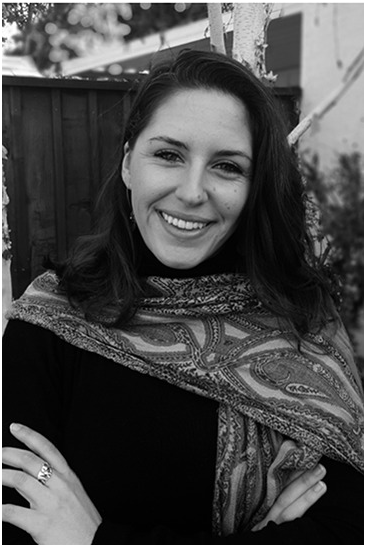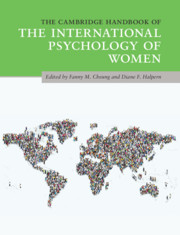Book contents
- The Cambridge Handbook of the International Psychology of Women
- The Cambridge Handbook of the International Psychology of Women
- Copyright page
- Dedication
- Contents
- Figures
- Tables
- Contributors
- Acknowledgments
- Section 1 The Underpinnings of Sex and Gender and How to Study Them
- Section 2 Developmental Perspectives of the International Psychology of Women
- Section 3 Cognitive and Social Factors
- Section 4 Work and Family Issues
- 19 Career Development of Women
- 20 The Psychology of Women in Entrepreneurship
- 21 Women’s Leadership across Cultures
- 22 Occupational Health Psychology and Women in Asian Contexts
- 23 Work–Family Interface and Crossover Effects
- 24 Intimate Relationships
- 25 Contextualizing the Many Faces of Domestic Violence
- Section 5 Inequality and Social Justice
- Section 6 Health and Well-Being
- Epilogue Some Final Thoughts and Take-Home Messages
- Index
- References
21 - Women’s Leadership across Cultures
Intersections, Barriers, and Leadership Development
from Section 4 - Work and Family Issues
Published online by Cambridge University Press: 20 July 2020
- The Cambridge Handbook of the International Psychology of Women
- The Cambridge Handbook of the International Psychology of Women
- Copyright page
- Dedication
- Contents
- Figures
- Tables
- Contributors
- Acknowledgments
- Section 1 The Underpinnings of Sex and Gender and How to Study Them
- Section 2 Developmental Perspectives of the International Psychology of Women
- Section 3 Cognitive and Social Factors
- Section 4 Work and Family Issues
- 19 Career Development of Women
- 20 The Psychology of Women in Entrepreneurship
- 21 Women’s Leadership across Cultures
- 22 Occupational Health Psychology and Women in Asian Contexts
- 23 Work–Family Interface and Crossover Effects
- 24 Intimate Relationships
- 25 Contextualizing the Many Faces of Domestic Violence
- Section 5 Inequality and Social Justice
- Section 6 Health and Well-Being
- Epilogue Some Final Thoughts and Take-Home Messages
- Index
- References
Summary
Gender equity in the workplace is not merely a moral imperative; it also affects the success of businesses and our ability to solve the world’s grand challenges. The gender gap in leadership is a global phenomenon rooted in cultural role expectations of men, women, and leaders. Although these expectations vary across cultures, women consistently face barriers from laws, socialization, formal organizational policies, and informal organizational practices that limit their opportunities to become leaders and inhibit their ability to be effective when they do obtain such positions. To address these barriers, we discuss how societies, organizations, and individual women and men around the world can facilitate women’s leadership through culturally-contextual leadership development strategies. We frame our discussion around the intersection of culture, gender, and leadership to understand how the interaction of these variables informs local considerations as to what barriers, and therefore interventions, are most relevant in their respective contexts
Keywords
- Type
- Chapter
- Information
- The Cambridge Handbook of the International Psychology of Women , pp. 300 - 316Publisher: Cambridge University PressPrint publication year: 2020
References
Suggested Readings

Rebecca J. Reichard is an Associate Professor of Organizational Behavior at Claremont Graduate University. She directs LeAD Labs, an applied research consulting group focused on leadership development. Her research and practice emphasize the development of individuals with traditionally less access to leadership opportunities, including minorities, women, and LGBT+ individuals. Reichard earned a PhD in management from the University of Nebraska–Lincoln. She is an active member of the Academy of Management and the Society of Industrial/Organizational Psychology, and is the past-chair of the scholarship group for the International Leadership Association. She has published more than 40 journal articles and book chapters on leader development.

Leslie Trainor, MBA, is a doctoral student in Organizational Psychology at Claremont Graduate University and a Research Associate at LeAD Labs. Her research interests are women in leadership and toxic leadership. Trainor concurrently serves as the Deputy Director of the Riverside County Economic Development Agency where she oversees Economic Development, Workforce Development, the Office of Foreign Trade, Marketing, the Office of Film and Television, and several of the County’s nonprofit affiliates. Trainor has been involved in private-sector and public-sector business for over seventeen years and most enjoys helping others become self-empowered. Trainor’s parents were in the military, so she lived in several different countries, with the most time spent in Germany. Her favorite memories of living in Germany include all the wonderful candy at the local Trinkhalle, Volksmarching with her family, and eating freshly baked Brotchen. At her current job, she regularly hosts delegations from other countries and finds the variety of cultural norms to be completely fascinating

Krista Lynne Jensen is a doctoral student studying Positive Organizational Psychology and Women’s Studies at Claremont Graduate University. Her research focuses on taking an intersectional approach to understanding and facilitating the development of women leaders. Specifically, Jensen is interested in identifying, testing, and implementing evidence-based organizational intervention strategies to address barriers to women’s leadership development. Jensen graduated from Santa Clara University, California in 2014 with a degree in Psychology and a minor in Anthropology.

Inmaculada Macias-Alonso is a Research Fellow at the Women and Public Policy Program at Harvard Kennedy School. Her research focuses on the effects of sex and gender on the quantitative and qualitative content of feedback. Her most recent work contrasts the “think-manager-think-male” phenomenon with the “female leadership advantage” through the examination of leadership feedback provided to men and women. Macias-Alonso holds a PhD and MSc in Organizational Behavior from IE Business School (Spain), an MA in Area Studies from Leiden University, a BA in Political Science from Universidad Nacional de Educación a Distancia, and a BA in Middle Eastern & Arabic Studies from Universidad Autonoma de Madrid. She has been a visiting lecturer at CESA School of Business in Bogota, a visiting graduate student at the Netherlands-Flemish Institute in Cairo, and an undergraduate exchange student at George Washington University in Washington, DC.

